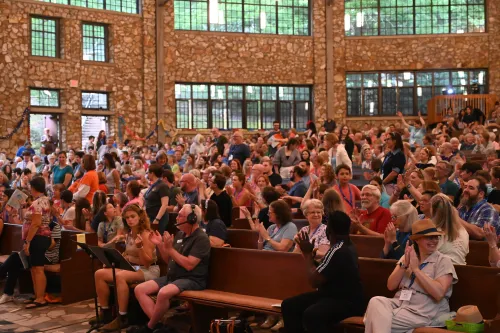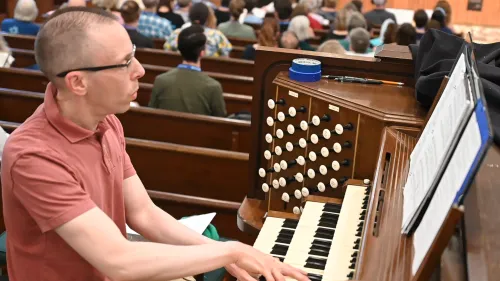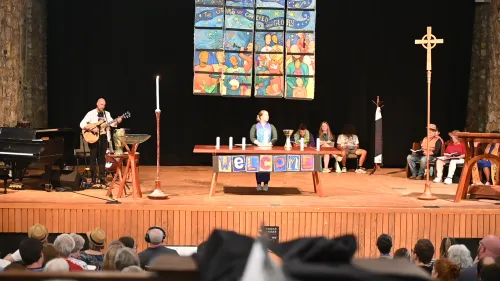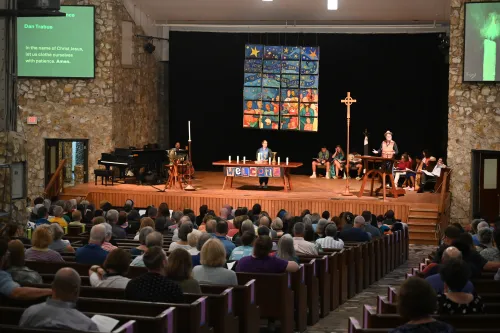Stellar worship opens this year’s Worship & Music Conference
Youth help lead an hour-long service that was beautiful in its simplicity
MONTREAT, North Carolina — Demonstrating the kind of innovative and thoughtful worship that keeps people returning again and again to the Worship & Music Conference put on annually by the Presbyterian Association of Musicians, the 650 or so people gathered Sunday in Anderson Auditorium at Montreat Conference Center sang beautifully and listened intently to testimony taken from Colossians 3:12-17, the central scripture for this year’s gathering with the theme “Clothed in Love.”

Singer and songwriter David LaMotte offered up his song “Just One Candle,” with the recurring theme, “And all the darkness in the world can’t extinguish the light of just one candle” and concludes with this verse:
“You can shrug and say love is a powerless tool/
That the real world is heartless and that hope is for fools/
But I’ve watched for the sunrise, and the truth is I’ve found/
It’s not Light that is fragile, it’s the other way ‘round.”
Youth played a prominent role during worship, reading scripture and liturgy written by the Rev. Dr. David Gambrell, the PC(USA)’s Associate for Worship.
And as might be expected from a large gathering of musicians and clergy, the hymn-singing was glorious. Hymns were accompanied by varying combinations of piano, organ, drum, guitar and handbells.
A worship highlight was brief testimony on six qualities found in the Colossians passage: Compassion by Dr. Tom Trenney, the conference’s co-service musician; Kindness by LaMotte; Humility by Gambrell; Meekness by Ana Hernández, this year’s Routley Lecturer; Patience by Dan Trabue, the conference’s artist in residence; and Love by Dr. Margaret Aymer, the conference preacher.

Trenney donned a green sweater, then talked about his “spiritual superhero,” Fred Rogers. “I learned a lot about the gospel from Mister Rogers before I heard it in Matthew, Mark, Luke and John,” Trenney said. Rogers used to tell the story of eight Special Olympics sprinters who helped a hurt competitor up and finished the race together arm in arm, all tied of them tied for first place. Rogers noted that spectators clapped and cheered for a long time, “and we know why: what really matters is helping others win, too,” Trenney said. “Each of us has the opportunity every day to change course and clothe ourselves in compassion, like those children did that day.”
“When I was young, I didn’t distinguish between nice and kind,” LaMotte said. “As an adult, those have come to be very different words.” Being nice can mean being polite and not upsetting people. “I have come to understand that kindness often means making waves,” LaMotte said. “I’m thinking nice is not what Jesus was going for. Kindness is not a feeling. It’s a way of treating people.” He used part of a quote by the Rev. Dr. Martin Luther King Jr. to get at a larger truth: “Sometimes you’ve got to turn the world upside-down in order to make it right.”

Gambrell recalled buying some new tennis shoes a day before a long hike that was part of a pilgrimage, holding the offending sneakers high for everyone to see. “Something about these shoes did not agree with my left foot,” he said. “I had to use crutches to lead the Easter vigil at my church.” But even more humbling was sharing that dusty roadway with his fellow pilgrims, many of whom had “left their own crutches behind, praying for God’s healing ministry.”
Hernández was surprised conference organizers asked her to talk about meekness, “because I hadn’t thought about meekness for a very long time.” A decade ago, her uncle began to constantly watch FOX News. “I thought, are you kidding? And then I thought, that’s not very gentle. I have learned to manage my internal weather.” It turns out her uncle’s youngest son had become a police officer in New York City, and his father feared for his safety every day. “Now I look behind what’s being said to discover why they’re saying it,” Hernández said.

Trabue talked about his two grandfathers, Herbert and Walter. As a boy, Trabue would walk into Herbert’s house and hear these words: “Come on over here and let me punch you in your snotty nose.” Walter used to wear the very hat that Trabue sported in worship in Walter’s honor. “He’d say, ‘hello there. Come on in,’ and he’d pat my head,” Trabue said. “He taught be to be very thankful for the people who are patient with us, and I thank God for them.”
While in graduate school, Aymer moved from New York to Atlanta, where she knew “not a soul,” and so Aymer, a single woman in her 30s, placed an ad on match.com, which was answered by “a strange-looking Frenchman” named Laurent. The two had their first date on Sept. 9, 2001, and spent four hours in a café talking about New York. After the terror attacks two days later, the first person in Atlanta to check on her well-being was Laurent. When she saw him, he was wearing an “I love New York” T-shirt with a matching hat. “That was my husband,” she said. “He wore his heart not only on his sleeve, but on his chest and his head.”
Last fall, Laurent died suddenly in his sleep. “He believed how we clothe ourselves can show our love to our neighbors,” Aymer said. She herself sported a stole Sunday that said, “Clothed in Love.”
Sunday’s blessing and charge included these words: “As God’s chosen ones, holy and beloved, clothes yourselves with compassion, kindness, humility, meekness and patience. Above all, clothe yourselves with love, which binds everything together in perfect harmony.”
You may freely reuse and distribute this article in its entirety for non-commercial purposes in any medium. Please include author attribution, photography credits, and a link to the original article. This work is licensed under a Creative Commons Attribution-NonCommercial-NoDeratives 4.0 International License.




